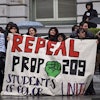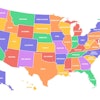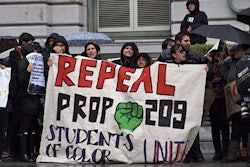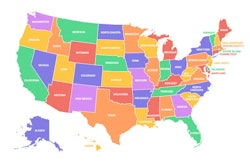Higher education institutions are grappling with cascading federal immigration  File photo
File photo
The document, titled "Understanding Refugees and Displaced Students on Campus: Recent Policy Impacts & Ways to Support," outlines how executive orders and legislative proposals in 2025 have created what experts call the largest mass de-legalization event in U.S. history, affecting students holding various humanitarian statuses.
The most dramatic impact came from the Supreme Court's May 29 decision in Noem v. Svitlana Doe, which terminated Cuban, Haitian, Nicaraguan, and Venezuelan (CHNV) parole programs. The ruling instantly stripped legal status from more than 400,000 CHNV parole beneficiaries who had been authorized to live and work in the U.S. for two years with financial sponsors.
"The temporary and uncertain nature of parole can create anxiety for students, faculty, and staff," the report states. "Institutions should anticipate increased advising and support needs."
On January 20, President Trump issued an executive order suspending all refugee admissions, which took effect January 27. The Department of State subsequently terminated contracts with resettlement agencies and the Welcome Corps private sponsorship program, including Welcome Corps on Campus.
The suspension left more than 120,000 approved refugees stranded abroad, including 14,000 with travel already booked. No refugees can be admitted until a Presidential Determination for fiscal year 2026 is issued—a document typically released by October 1 that sets the annual refugee admissions ceiling.
Special Immigrant Visa (SIV) holders, primarily Afghan and Iraqi nationals who served the U.S. government, also face disruption. While the Afghan SIV program remains authorized through December 31, 2025, flights for approved SIVs were halted in January, forcing recipients to arrange their own travel and resettlement.
Temporary Protected Status designations for eight countries have been terminated or are set to expire this year, affecting nearly 730,000 individuals. TPS for Afghanistan, Cameroon, Honduras, Nepal, and Nicaragua has already ended. Syria's designation is set to expire November 21, while Haiti's termination is stayed by court order until February 3, 2026.
Venezuela presents the most complex situation, with two separate designations affecting more than 516,000 people combined. Court orders have extended some protections, but uncertainty persists.
"Given the wave of extensions, terminations, and litigation in 2025, campuses should share resources to students to track re-registration and EAD re-verification dates," the report advises.
A June 4 executive order imposed travel bans on 12 countries and severe immigration restrictions on seven additional nations—many of which are sources of refugee-background students. The ban applies to F-1, J-1, and M-1 visa applicants from 19 countries who were outside the U.S. and lacked valid visas as of June 9.
Banned countries include Afghanistan, Chad, Equatorial Guinea, Eritrea, Haiti, Iran, Libya, Myanmar, Republic of Congo, Somalia, Sudan, and Yemen, with additional restrictions on Burundi, Cuba, Laos, Sierra Leone, Togo, Turkmenistan, and Venezuela.
The proposed "One Big Beautiful Bill" threatens to revoke refugees' eligibility for Medicaid, Medicare, and SNAP benefits unless they have adjusted to Lawful Permanent Resident status. The legislation would also increase application fees for status adjustments and impose new fees on asylum seekers for both initial applications and annual renewals while cases are pending.
A draft bill released by a House subcommittee in early September would zero out funding for key Office of Refugee Resettlement programs, including Refugee Cash and Medical Assistance and programming for refugee career pathways and youth.
The report urges institutions to create "welcoming campuses that affirm belonging and stability in the face of more restrictive immigration policies." Specific recommendations include:
- Training admissions, financial aid, and registrar staff to recognize various forms of humanitarian documentation
- Providing culturally responsive mental health care and timely legal information or referrals
- Building partnerships with local organizations to expand housing, employment, and academic support
- Ensuring Designated School Officials understand how different statuses interact with F-1 visa requirements
The Presidents' Alliance's Legal Pathways that Work initiative now offers free virtual legal consultations to TPS recipients and humanitarian parolees holding bachelor's degrees or higher, focusing on employment-based visa options and other pathways to lawful status.
Multiple lawsuits challenging various executive orders remain in progress, including Pacito v. Trump on refugee admissions and CHIRLA v. Noem on expedited removal for parole beneficiaries.
As of July 2025, approximately 3.4 million asylum cases were pending before U.S. Immigration Courts, with average processing times of four to six years. Processing slowdowns at U.S. Citizenship and Immigration Services have further delayed work authorizations and status adjustments, leaving many students in extended legal uncertainty.


















